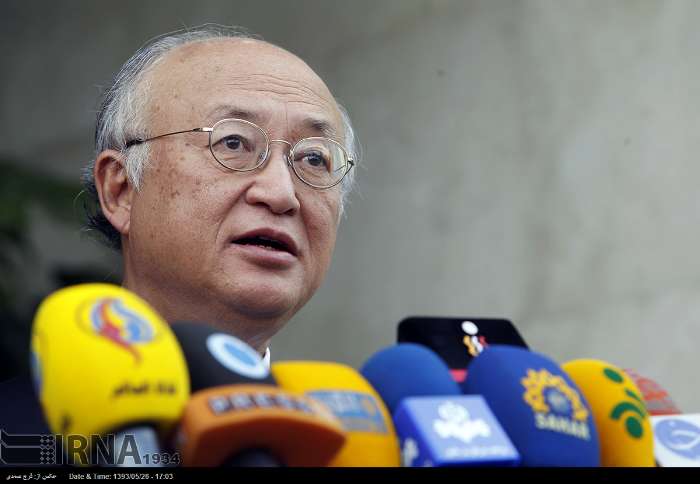 Agency head Yukiya Amano says Islamic Republic has not addressed concerns regarding its alleged attempts to develop atomic weapons
Agency head Yukiya Amano says Islamic Republic has not addressed concerns regarding its alleged attempts to develop atomic weapons
An agreement between Iran and the international community regarding the Islamic State’s nuclear program is unlikely to be signed before the March deadline for negotiations, chairman of the International Atomic Energy Agency Yukiya Amano said Friday.
In an interview with Israel Radio, Amano added that the Islamic Republic had so far been unresponsive to a series of questions regarding its nuclear program and had failed to adequately address concerns over its alleged attempts to develop atomic weapons.
“We have to be very careful because we know who we are negotiating with,” Amano stressed.
Earlier Friday, Amano met with Israel’s Strategic Affairs Minister Yuval Steinitz on the sidelines of an annual security conference in Germany. During the meeting, Steinitz stressed that any agreement with the Islamic Republic must ensure that Iran possesses no capability of developing nuclear weapons in the future, Israel Radio reported. Amano later expressed understanding of Israel’s position on the Iranian nuclear issue.
Meanwhile, US Secretary of State John Kerry, who also attended the conference in Germany, stressed to his Iranian counterpart that the US aimed to meet the late March deadline for a deal.
Kerry “reiterated our desire to move toward a political framework by the end of March,” a senior US official said after the secretary met Foreign Minister Mohammad Javad Zarif for two hours in Munich.
Global powers have been struggling for more than a year to pin down a comprehensive deal to rein in Iran’s suspect nuclear program, after an interim accord was struck in November 2013.
After missing two previous deadlines, the group known as the P5+1 — Britain, China, France, Germany, Russia, and the United States — set a March 31 deadline for a political agreement.
That would be followed by a final deal setting out all the technical points of what would be a complex accord by June 30.
But the atmosphere has been complicated by hardliners both in Iran and the United States, with US lawmakers threatening to impose new sanctions on Iran if the March deadline is missed.
So far, Iran has frozen some of its nuclear enrichment program in return for limited sanctions relief.
“We face a major opportunity in resolving the Iranian nuclear issue. China is ready to enhance communication and cooperation with relevant parties to work for the early conclusion of a just, balanced and comprehensive agreement,” China’s State Councillor Yang Jiechi told the Munich Security Conference.
But in a renewed sign of tensions, Iran’s President Hassan Rouhani berated the world’s nuclear powers on Wednesday, saying atomic weapons had not kept them safe, and reiterating his country was not seeking the bomb.
He avoided explicit mention of the ongoing nuclear talks, but accused atomic-armed states of hypocrisy.
“They tell us ‘we don’t want Iran to make atomic bombs,’ you who have made atomic bombs,” Rouhani said.
Kerry and Zarif have met many times over the past months, mostly in European capitals, as they have sought to hammer out a deal. Their political teams have also been negotiating behind the scenes.
By The Times of Israel
The Iran Project is not responsible for the content of quoted articles.

 QR code
QR code